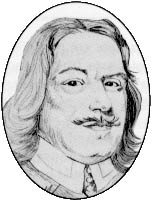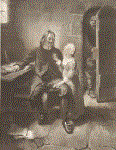
1628 – 1688
 It was his blind daughter Mary, a teenager, who upset him most when he was in prison. Day by day she groped and stumbled her way to the jail where her father was to spend thirteen years, supplementing the wretched prison fare with whatever food she could carry. Bunyan was haunted by what might befall her in a cruel world. If he died in prison, who would look out for her? How could a penniless blind woman survive?
It was his blind daughter Mary, a teenager, who upset him most when he was in prison. Day by day she groped and stumbled her way to the jail where her father was to spend thirteen years, supplementing the wretched prison fare with whatever food she could carry. Bunyan was haunted by what might befall her in a cruel world. If he died in prison, who would look out for her? How could a penniless blind woman survive?
Already the shock of his sudden imprisonment had caused his wife Elizabeth to miscarry. Seeing his agitation, prison authorities informed him that he need not remain in jail; in fact, he could go home that afternoon. All he had to do was sign a paper promising never to preach again. Immediately he knew what he head to do: he had been called to preach and would no nothing else.
John Bunyan was born at Elstow, near Bedford, England. When only sixteen he was conscripted for the Parliamentary (that is, the anti-Royalist) Army in the English Civil War. The Parliamentary Army included many soldiers and officers of the Puritan persuasion. Two sermons were preached to the men every Sunday (plus another on Thursday!), while scripture reading and prayers customarily began the soldier’s work-day. A twelve pence fine was assessed any soldier found swearing. (Bunyan’s vocabulary, at this time, contained little else.)
In the unforeseeable providence of God, it was while he was an unbeliever, hostile to the Christian faith and rendering enforced military service, that Puritan tenets began to seep into his mind and heart. He became convinced of the authority of scripture, the need for holy living, the centrality of preaching in worship, and God’s sovereign ordering of life. Seeds were sown which later brought for the fruit in profusion.
Discharged from the Parliamentary Army, Bunyan returned to the family trade of tinker. (Tinkers were blacksmiths who worked in assorted metals from heavy iron to kitchen cooking utensils.) One morning, looking as usual for business from homemakers, he came upon three or four poor women who were resting briefly from their domestic responsibilities. Bunyan sidled closer and found them talking earnestly to each other. “They talked of how God had visited their souls with his love in the Lord Jesus. . . .” Bunyan later reported. “They spake as if joy did make them speak . . . they were to me as if they had found a new world.” And so they had.
The women were members of the Puritan Free Church of Bedford. Its pastor, John Gifford, had been an officer-physician in the Royalist (anti-Puritan!) Army. Grace had subsequently overwhelmed this notorious blasphemer, drunkard and gambler. He gave up his medical practice in Bedford to become the first pastor of the Nonconformist congregation. Under the threefold influence of the women, the pastor, and Luther’s commentary on Galatians, the tinker was forged into that force whose name would become known throughout the English-speaking world.
Bunyan’s ministry unfolded just as the Royal Restoration of 1660 rendered illegal all worship not conducted according to the forms of the Church of England. In no time Bunyan was arrested and sentenced. Prison conditions were unspeakable. Yet it was in prison that his preaching and counselling brought salvation and comfort to scores of men whose bleak prospects were otherwise unalterable. It was also in these most trying circumstances that he produced at least nine books! (He wrote more than sixty.)
Upon his release from prison he drafted the masterpiece which was to be a trophy of Puritan thought and a classic of English literature. Who will ever forget the characters from Pilgrim’s Progress? Mr. Talkative; Mr. Formalist; Mr. Ready-to-Halt; Judge Hategood; even the young woman, Dull. Not to mention Giant Despair, who lurked near the Slough of Despond and Doubting Castle. (Release from the Castle was secured only as Christian used the Key of Promise.)
Courageous in the face of social and political harassment, Bunyan exemplified the apostle Paul’s “in any and all circumstances” (Phil. 4:12), for while in prison he upheld the gospel at the same time as he made thousands of bootlaces to support his family. Rightly distinguishing between the core of the gospel (which cannot be compromised) and church practices (which admit of different interpretations), Bunyan refused to take sides in the denominational wrangle over believers’ versus infant baptism. He insisted that faith alone rendered one a Christian, and faith was sufficient to endear Christians to each other and make them welcome at each other’s communion table.
In August, 1688, he began a forty-mile ride on horseback from Bedford to London. An icy rain drenched him. In two days he was delirious with pneumonia. Within two weeks he was dead.
Bunyan’s remains are buried in Bunhill Fields, London, surrounded by the remains of the other saints. John Owen, the greatest Puritan intellect; Isaac Watts, the finest English hymnwriter; William Blake, poet; Susanna Wesley, mother of John and Charles.
Bunyan’s influence is inestimable. By 1692 one hundred thousand copies of Pilgrim’s Progress were in print. Today the book is found in over one hundred translations. When China’s Communist government printed two hundred thousand copies as an example of Western cultural heritage, the printing sold out in three days.
While Bunyan lacked almost all formal education, his English was singularly precise, fluid and expressive. What accounts for it? Robert Browning, the poet, offered this explanation:
His language was not ours;
‘Tis my belief God spake;
No tinder has such powers.